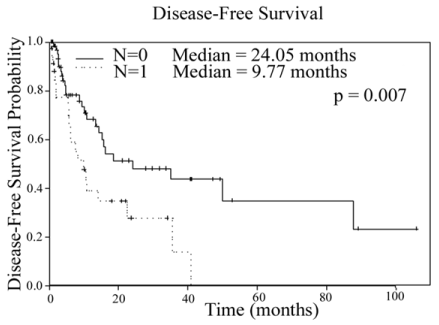# 101384 Abstract ID: 101384 Pathologic Nodal Status Predicts Disease-Free Survival after Neoadjuvant Chemoradiation for Gastroesophageal Junction Carcinoma
Jeffrey G Gaca, David H Harpole Jr, Thomas A D'Amico, Theodore Pappas, Hilliard F Seigler, Walter G Wolfe, Douglas S Tyler, Durham, NC
Introduction: Gastroesophageal junction (GE Jxn) tumors are an aggressive, poorly defined subset of gastric and esophageal neoplasms. We examined outcome in patients receiving neoadjuvant chemoradiation for GE Jxn tumors in order to identify factors that predict disease-free (DFS) and overall survival (OS). Methods: A retrospective analysis of 101 consecutive patients with tumors within 5 cm of the GE Jxn treated preoperatively with 5-flourouracil based chemoradiation (45 Gray) dating between 1992 and 2000 form the basis of this study. Results: Complete primary tumor responses (T0) to neoadjuvant chemoradiation was achieved in 35 patients, yet persistent nodal disease (N1) was identified in seven of these patients. The median DFS and OS of all patients were 16 and 25 months, respectively. Kaplan-Meier analysis revealed that patients who were pathologic stage T0, N0 experienced greater DFS compared to all others (p=0.02) and that N0 patients experienced improved DFS (median 24 months) compared to N1 patients (median 9 months).(see Figure) Preoperative stage, age, tumor location (gastric v. esophageal), or Barretts esophagus did not independently predict survival by univariate analysis. Surprisingly, multivariate analysis demonstrated that only post-treatment nodal status (p=0.03) and not the degree of primary tumor response predicted DFS. Conclusion: Neoadjuvant chemoradiation prior to surgical resection allows for prognostic stratification of GE jxn tumors. Poor outcome in node positive patients supports the utility of pre-surgical nodal staging (EUS, PET), as surgical aggressiveness should be tempered by the realization that cure is unlikely and median survival short.

|
 500 Cummings Center
500 Cummings Center +1 978-927-8330
+1 978-927-8330
 +1 978-524-0461
+1 978-524-0461